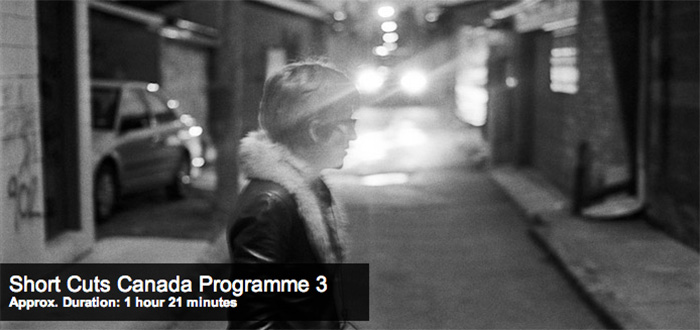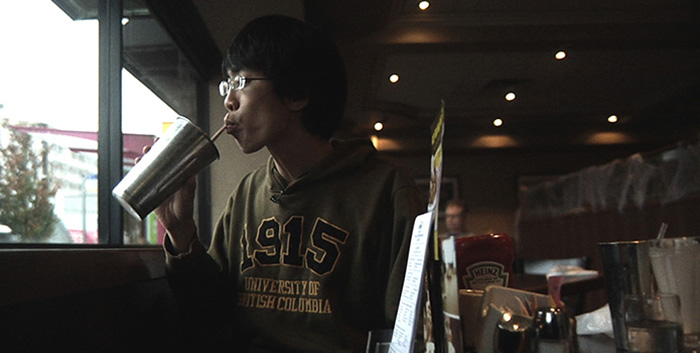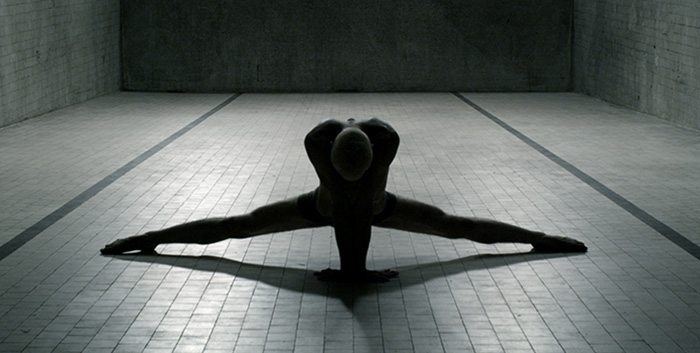
With all the buzz around world premieres and gala events happening at the Toronto International Film Festival, it’s easy to forget there is also a pretty stellar shorts program in the mix. Consisting of work spanning all genres, the format is a great way to experience new, upcoming talent as well as to check up on a couple familiar faces too. And—new this year—24 hours after their Festival premiere, films will be available to screen at YouTube.com/TIFF until September 19.
The following is a collection of capsule reviews, scores and full shorts where available for each film in screening block 3.

We Wanted More – 15 minutes
We all make sacrifices in life—mostly in a career versus family fashion. As an indie-rocker on the cusp of world tour greatness, Hannah (Christine Horne) has approached the end of the road as far as hoping to accomplish both. With her last show before flying out garnering massive applause, the only thing she really cared about was knowing her boyfriend came to see her off. He didn’t. And from here we watch her internal struggle with finally saying goodbye to the life they could have had together and hello to endless possibilities.
But in a Last Temptation of Christ sort of way, it isn’t just nerves that send her harshest test yet. While psychological fear leads to the loss of her voice, even her agent Karen (Angela Asher) knows it’s not a permanent issue. No, the real trial was seeing exactly how far Hannah’s mind would take her towards discovering whether more was still a possibility. This is where its horror aspects come to play, turning a brief spell with laryngitis into a fully grown child that could be hers to keep, raise, and love (Skyler Wexler). This girl could be the one thing Hannah will ever need as well as the catalyst to win back her boyfriend in a happily ever after fantasy. The choice is hers alone and boy does she make it with authority.
Written by director Stephen Dunn and co-writer Margaret Rose Lester from a story treatment by Dunn and A.J. Bond, We Wanted More is a harrowing psychological thriller about weighing priorities and understanding what it really is you covet most. Backed by vocalist Erin Eaton, Hannah is brought to life as more than simply the make-up and costume worn to entertain thousands of fans. She is a woman with maternal desires who cannot and should not make a decision such as giving up a year or more of her soul to the music lightly. Her body forces her to experience the potential domesticity it would play out inside her head and by the end her selection won’t be about postponing one or the other. No, this choice is forever—the lesser dream will need to be murdered to achieve the spoils of either motherhood or fame.
A-

Candy – 8 minutes
A film about service for goods transactions—a cornerstone in our everyday lives—Cassandra Cronenberg’s cinematic debut Candy looks to show how we all fall prey to needs, desires, and wants. Sometimes it’s for an escape, sometimes fulfillment. But no matter the reasons, we go about our lives selling ourselves to the highest bidder; each of us a whore playing the survival game to strive towards earning both satisfaction and purpose in the process.
It’s no surprise then that the titular soul in the middle of it all is a prostitute (Drew Deveaux) constantly found on her knees at an alleyway staircase behind the club her customers exit as though a revolving door. She gives oral sex and in return receives cash, lighters, and poems spoken with oddly prescient words describing the poet’s (Marc Di Saverio) inevitable demise at the hands of a woman refusing his offer of a cigarette. Candy receives payment graciously, in love with her job of making these characters feel necessary, a perfect contrast to their willingness to constantly leave the “party” and escape the harshness of their artistic lives supported solely on the whims of fickle audience.
Cronenberg portrays an absence of this reciprocation as a final nail in the coffin; our entire being becoming forfeit when the thing we’re selling is no longer in demand. Candy, on the other hand, will always be coveted as a drug of solace existing to give the jaded world a glimpse of love. Only when she gifts something without receipt that she reveals what it is she truly desires. It’s the same generosity she’s always shown but in a different light. It’s an effortless transformation to show her as someone able to play the game and still retain the individuality of a private life with one object of affection and desire.
As artists are swallowed by career until it takes over their lives, Candy returns home to shed her skin knowing the rest was just a means to end. She is the audience giving applause and satisfaction throughout this experimental short with full knowledge that the favor will be returned by the one she loves. It’s only these creatures basking in the ego of mass appeal, needing the constant approval to keep on going that find themselves drained of what it was that made them want to create in the first place. The prostitute therefore becomes our aspiration—a master of two worlds never left wanting.
B

Jimbo – 25 minutes
There’s no better way to understand mental illness than experiencing it firsthand. Ryan Flowers’ documentary short Jimbo provides this window into the life of OCD and Asperger’s afflicted schizophrenic Jimmy Leung. Unable to focus or share his ideas without disappearing into conspiracy theories and far-fetched dreams, this young man wants nothing more than to become the next Arnold Schwarzenegger. He fantasizes about meeting Joe Weider, using his connections to meet his Austrian idol, and in turn be put into contact with director James Cameron once he wows them with his talents.
Before any of this can occur, however, he’ll first need to be noticed. And that’s where Flowers comes in. Being the only filmmaker Jimmy knows, a slew of phone calls finally culminate in Ryan agreeing to help “enhance his reputation”. Years of mental hospital employees, social workers, realtors, and sales clerks have judged Jimmy for his illnesses, so now is the time to set the world straight. He’ll need assistance polishing his scripts, learning the about brevity and efficiency when it comes to business meetings, and film a reel of reenactments from Terminator 2: Judgment Day to showcase his acting. It’s a daunting task, but Ryan sticks with him to the end.
Never exploitative and always good-naturedly affecting, Jimbo gives us a unique perspective on what it means to be trapped within a prison of limited possibilities. We watch Jimmy become depressed, lashing out at those with the patience to make his ideas reality. We see the high points of satisfaction as he delivers his Terminator lines without the Austrian accent he cannot stop himself from attempting. And we acknowledge the uncertainty of which Jimmy will show up on a given day. Frustrations abound as incoherent ramblings mix with half-ideas while a lack of communication skills paints him into a corner of anger at his inability to be understood. A tragic slice of life full of optimism, however, Jimmy Leung has made it to the big screen.
B

Portrait as a Random Act of Violence – 4 minutes
With a bit of performance art meets sculptural presentation, Randall Okita puts the power of his work onscreen to show both the destruction of its creation and the beauty of its completion. Entitled Portrait as a Random Act of Violence, the name could speak towards the movie as a depiction of him within his process or the physical result of his artistry pulled up from a chaos of broken glass into a fully formed three-dimensional figure via a pulley system and a regular old cement block. While the violent shattering of windows may seem random, the result of its kinetic force is anything but.
Carefully constructed through multiple camera angles, we see the story of Okita’s latest sculpture devoid of the man-hours spent in creating it. By transforming what would usually be something on display at museum into a narrative, he gives the piece in a way an artist’s statement never could. We’ll never know how the glass shards go from smashed bits on the floor to beautifully rendered life-size individual suspended in the air. But even without seeing the process we can understand his thematic meaning of building something out of the scorched remains of violence—molding beauty from the ashes of aggression, hate, and fear.
B

Method – 8 minutes
An attempt to shroud the truth surrounding the plot of actor Gregory Smith‘s directorial debut short hinders more than helps its end result. The press blurbs and shortened synopsis all pretend that Method is about a cop (Shawn Doyle) attempting to coerce a confession out the distraught woman presently in his custody (Sarain Boylan). But that’s only around two minutes of what Smith and Peter Mooney have written. The rest deals with the fact that Daniel O’Shea the police officer is really just a character played by a slightly hungover actor who can’t remember his lines.
Spoiler alert—but not really. No, the whole concept behind the film is for this actor to find the ability to conjure the tenacity and control his character must possess in order for audiences to believe in his actions onscreen. We’re not watching a straight comedy about a bumbling cop having a complete nervous breakdown in an interrogation room; this is an actor channeling through life experiences so that he may unearth an emotion to use on set. Deciding to take ten minutes at a coffee shop across the street to dig deeper for inspiration, he never could have known just how exacting an experience he was about to get.
There’s a lot more to Smith’s work than one easy reveal somehow forcing an entire marketing campaign to only discuss a quarter of the final runtime. There are layers to what unfolds that take it into movie-within-a-movie territory with a spice of reality versus fantasy dynamic. Doyle provides the role with the nervous tension of being lost, the extreme anxiety of finding himself, and the calm poise of a man ready for action within Method‘s fun and twisty three-act structure. Far from being simple enough to warrant a need to hide, Smith and company should be embracing its secrets rather than fearing them.
B+

In Guns We Trust – 12 minutes
If President Obama gets his way on the anti-gun laws he’s attempting to push through with or without Congress’ acceptance, he may have the entire population of Kennesaw, GA coming his way to stage a coup. As one of its citizens says in Nicolas Lévesque‘s documentary In Guns We Trust, Thomas Jefferson fought to have gun ownership put into the Bill of Rights so that the people had a means to overthrow any government that empowered itself with too much control. Kennesaw takes that to heart and honestly believe gun ownership isn’t a courtesy given by politicians. No, God is the one who gave them that right.
Whether you believe this or not—I don’t think Lévesque truly takes a side to vilify—you can’t deny the heritage behind the prevalence of guns in their community. Firearms helped secure our freedom from the British and being the self-sufficient nation we are, why should we wait for the police to come when we can protect our home ourselves? Kennesaw’s 1982 law enforcing that every head of household was legally obligated to own and operate a firearm with ammunition might have been passed under juvenile purposes, but they’ve taken it to heart for thirty years and built a safe place to live as a result.
Shot in black and white with mostly still photographs shown while interviewees speak on who they are and what their position is, In Guns We Trust takes a candid look at an America willing to fight for their right to bear arms. These aren’t crackpots going on about murdering immigrants or spouting racist rhetoric either—or maybe Lévesque edited that out. They are concerned folks with a common understanding of what it means to be a responsible American. And if you truly look beyond the Confederate flags to truly think on a world where we diligently educated our children about gun control, perhaps we wouldn’t have so many school massacres. Or maybe we’d have more.
B

Der Untermensch – 9 minutes
I’m nowhere near anything resembling an authoritative voice on modern dance so I’ll differ my deductive reasoning to those who know better by simply reiterating what the TIFF website says about Kay Mejri‘s Der Untermensch. To me it’s a formally intriguing series of movements and gyrations on behalf of Simon Vermeulen‘s athleticism and choreography while those in the know more accurately describe it as a depiction of the mistreatment of homosexuals during World War II.
The stark backgrounds of drained pools and tiled floors, the clear casts of feet on which Vermeulen wrings water before eventually finding himself ensnared within, and the motifs of covered heads and screaming are all obviously powerful imagery resonating above mere initial perception. Unfortunately for me, looking past the stunning aesthetic and captivating score to get at the heart of what I’m told is truly unfolding is an impossibility. I don’t doubt it’s there; I just honestly can’t comprehend it. That’s my burden to bear, however, and no shortcoming to the film itself. Either way you slice it, Der Untermensch is an attractive performance piece possessed by high skill and dedication.
B-
Short Cuts Canada Programme 3 played at the Toronto International Film Festival on September 9th & 10th.


